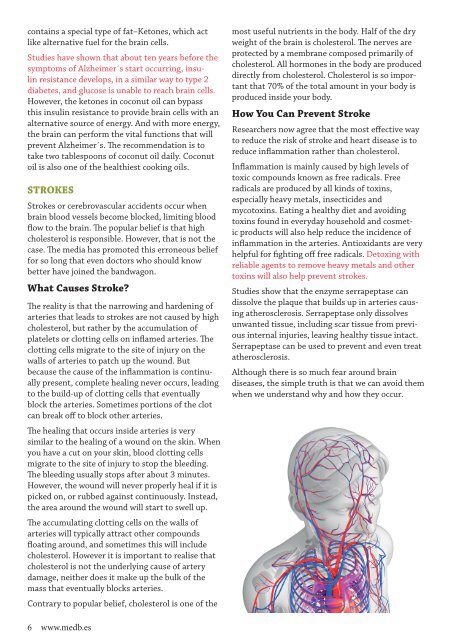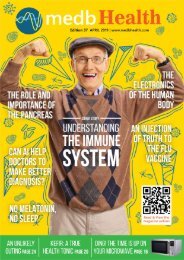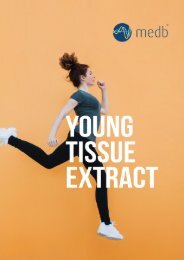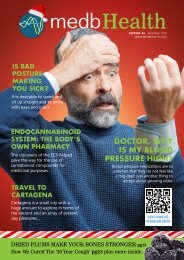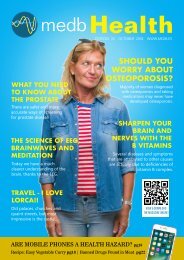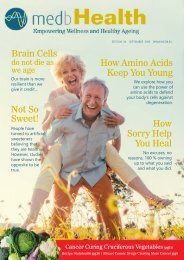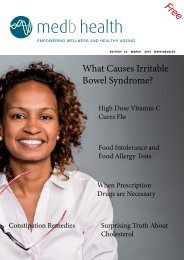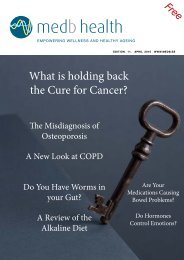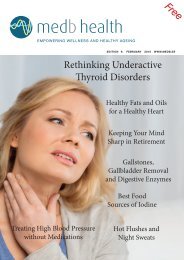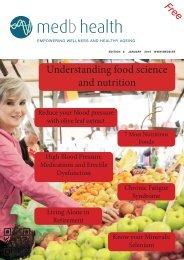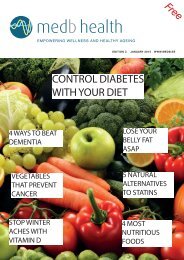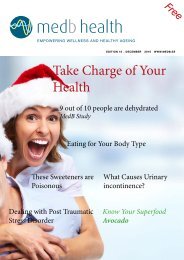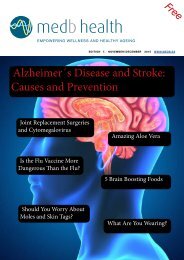Preventing Alzheimer's Disease and Stroke
There is strong clinical evidence that chronic diseases of the brain can be prevented and even reversed.
There is strong clinical evidence that chronic diseases of the brain can be prevented and even reversed.
Create successful ePaper yourself
Turn your PDF publications into a flip-book with our unique Google optimized e-Paper software.
contains a special type of fat–Ketones, which act<br />
like alternative fuel for the brain cells.<br />
Studies have shown that about ten years before the<br />
symptoms of Alzheimer´s start occurring, insulin<br />
resistance develops, in a similar way to type 2<br />
diabetes, <strong>and</strong> glucose is unable to reach brain cells.<br />
However, the ketones in coconut oil can bypass<br />
this insulin resistance to provide brain cells with an<br />
alternative source of energy. And with more energy,<br />
the brain can perform the vital functions that will<br />
prevent Alzheimer´s. The recommendation is to<br />
take two tablespoons of coconut oil daily. Coconut<br />
oil is also one of the healthiest cooking oils.<br />
STROKES<br />
<strong>Stroke</strong>s or cerebrovascular accidents occur when<br />
brain blood vessels become blocked, limiting blood<br />
flow to the brain. The popular belief is that high<br />
cholesterol is responsible. However, that is not the<br />
case. The media has promoted this erroneous belief<br />
for so long that even doctors who should know<br />
better have joined the b<strong>and</strong>wagon.<br />
What Causes <strong>Stroke</strong>?<br />
The reality is that the narrowing <strong>and</strong> hardening of<br />
arteries that leads to strokes are not caused by high<br />
cholesterol, but rather by the accumulation of<br />
platelets or clotting cells on inflamed arteries. The<br />
clotting cells migrate to the site of injury on the<br />
walls of arteries to patch up the wound. But<br />
because the cause of the inflammation is continually<br />
present, complete healing never occurs, leading<br />
to the build-up of clotting cells that eventually<br />
block the arteries. Sometimes portions of the clot<br />
can break off to block other arteries.<br />
The healing that occurs inside arteries is very<br />
similar to the healing of a wound on the skin. When<br />
you have a cut on your skin, blood clotting cells<br />
migrate to the site of injury to stop the bleeding.<br />
The bleeding usually stops after about 3 minutes.<br />
However, the wound will never properly heal if it is<br />
picked on, or rubbed against continuously. Instead,<br />
the area around the wound will start to swell up.<br />
The accumulating clotting cells on the walls of<br />
arteries will typically attract other compounds<br />
floating around, <strong>and</strong> sometimes this will include<br />
cholesterol. However it is important to realise that<br />
cholesterol is not the underlying cause of artery<br />
damage, neither does it make up the bulk of the<br />
mass that eventually blocks arteries.<br />
Contrary to popular belief, cholesterol is one of the<br />
most useful nutrients in the body. Half of the dry<br />
weight of the brain is cholesterol. The nerves are<br />
protected by a membrane composed primarily of<br />
cholesterol. All hormones in the body are produced<br />
directly from cholesterol. Cholesterol is so important<br />
that 70% of the total amount in your body is<br />
produced inside your body.<br />
How You Can Prevent <strong>Stroke</strong><br />
Researchers now agree that the most effective way<br />
to reduce the risk of stroke <strong>and</strong> heart disease is to<br />
reduce inflammation rather than cholesterol.<br />
Inflammation is mainly caused by high levels of<br />
toxic compounds known as free radicals. Free<br />
radicals are produced by all kinds of toxins,<br />
especially heavy metals, insecticides <strong>and</strong><br />
mycotoxins. Eating a healthy diet <strong>and</strong> avoiding<br />
toxins found in everyday household <strong>and</strong> cosmetic<br />
products will also help reduce the incidence of<br />
inflammation in the arteries. Antioxidants are very<br />
helpful for fighting off free radicals. Detoxing with<br />
reliable agents to remove heavy metals <strong>and</strong> other<br />
toxins will also help prevent strokes.<br />
Studies show that the enzyme serrapeptase can<br />
dissolve the plaque that builds up in arteries causing<br />
atherosclerosis. Serrapeptase only dissolves<br />
unwanted tissue, including scar tissue from previous<br />
internal injuries, leaving healthy tissue intact.<br />
Serrapeptase can be used to prevent <strong>and</strong> even treat<br />
atherosclerosis.<br />
Although there is so much fear around brain<br />
diseases, the simple truth is that we can avoid them<br />
when we underst<strong>and</strong> why <strong>and</strong> how they occur.<br />
6 www.medb.es<br />
MedMag_Vol7.indd 6 05/11/2015 15:50:01


